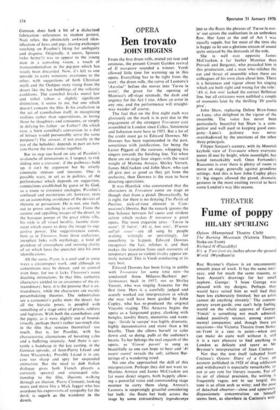OPERA
Ben trovato
JOHN HIGGINS
From the first drum rolls, muted yet taut and ominous, the present Covent Garden revival of Ii trovatore sounded a winner. Verdi allowed little time for warming up in this opera. Everything has to be right from the start: the drum rolls, the curve of Leonora's 'Ascolta!' before she moves into 'Tacea la notte', the grace for the opening of Manrico's off-stage serenade, the dash and urgency for the Act 1 trio. Allow an error in any one, and the performance will straight- way wander off course.
The fact that on the first night each was gloriously on the mark is in part due to the engagement of the strongest Trovatore cast assembled in London since Callas, Simionato and Johnston were here in 1953. But a lot of the credit must go to Edward Downes: Mr Downes has been reprimanded in the past, sometimes with justification, for being the Lester Piggott of the rostrum, whipping his singers towards the finishing line. Yet when there are on stage four singers with the vocal weight of Martina Arroyo, Shirley Verrett, James McCracken and John Shaw, who can all give just as good as they get from the orchestra, then Downes is the man to have directing operations.
It was Hanslick who commented that the characters in Trovatore come on stage as though shot from a pistol. Dramatically, he is right, for there is no denying The Perils of Pauline, nick-of-time element in Cam- marano's libretto. But the remark ignores the fine balance between bel canto and strident action which makes ll trovatore a great opera. The most exquisite arias—'Tacea la none', balen', 'A h si, ben ratio', 'D'amor sull'ali rosee'—are all sung by people waiting, wittingly or unwittingly, for something to happen. Edward Downes recognises the fact, relishes it, and then makes the transition from such moments of temporary peace to violent rivalry appear en- tirely natural. This is Verdi conducting at its very best.
Edward Downes has been living in public with Trovatore for some time now—he conducted those Milanov/Barbieri per- formances back in 1957; not so Shirley Verrett, who was singing Azucena for the
first time. Hers is a carefully judged and acutely worked out interpretation in which she may well have been guided by John Copley, who has re-produced the original Visconti staging. This Azucena begins the opera as a fairground gypsy, clanking With
bangles, tawdry finery, memories and warn- ings: 'Stride la varnpa' was highly dramatic,
highly demonstrative and more than a bit breathy. Then she allows herself to calm down and, so doing, pulls at the audience's
hearts. To her belongs the real anguish of the opera, as 'Giorni poveri' is sung as beautifully as one can hope to hear and 'Ai nostri ',fora reveals the soft, airborn flut- terings of a wandering mind.
No one else approached the skill of this interpretation. Perhaps they did not want to.
Martina Arroyo and James McCracken are far more direct singers, both happily allow- ing a powerful voice and commanding stage
manner to carry them along. Arroyo's Leonora is surprisingly graceful considering her bulk: she floats her body across the stage by some extraordinary legerdecorps just as she floats the phrases of 'Tacea la not- te' out across the auditorium in an unbroken flow. Her faint at the end of Act I was equally supple, but for most of the time she is happy to let out a glorious stream of sound quite untaxed by the demands of the role.
She is well cast opposite James McCracken, a far beefier Manrico than Prevedi and Bergonzi, who preceded him in this production, and a man who relishes the cut and thrust of ensemble when there are colleagues of his own class about him. There is a fierceness and vigour about his singing which are both right and wrong for the role: `Ah si, ben ratio' lacked the correct Bellinian line, but all criticisms were nullified a couple of moments later by the thrilling 'Di quella pira'.
John Shaw, replacing Delme Bryn-Jones as Luna, also delighted in the vigour of the ensemble. The voice has never been particularly beautiful but Shaw is a com- petitor and well used to keeping good coin- pany—Luna's jealousy was never overshadowed by the emotions of the other three principals.
Filippo Sanjust's scenery, with its Moorish keyhole view of Trovatore where everyone seems ill met by bright, white moonlight, has lasted remarkably well. Once Ferrando's Racconto is over there is plenty of room to move on stage, generally against grandiose settings. And this is how John Copley plays it: big singers allowed the grand, dramatic gestures in the most exciting revival to have come London's way this season.


































 Previous page
Previous page